Paigah family
Paigah is a family in the senior aristocracy of Hyderabad State and each maintained his own court, individual palaces, and a standing army of about fourteen thousand troops, both infantry and cavalry.
| Paigah پایگاه | |
|---|---|
| Noble family | |
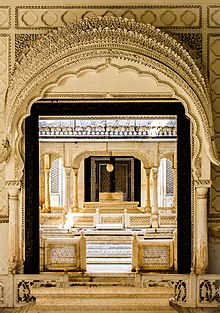 | |
| Country | Hyderabad State |
| Connected families | Asaf Jahi dynasty Pataudi family |
| Dissolution | 1948 |
Sir Vicar-ul-Umra, a Paigah nobleman who also served as the Prime Minister of Hyderabad presented the Falaknuma palace to the sixth Nizam, Mir Mahbub Ali Khan, in 1897-98, as Nazar (offering).
History
The word Paigah, which means pomp and rank in Persian, was a title given by the second Nizam of Hyderabad to Nawab Abul Fateh Taig Jung Bahadur in appreciation of the royal services rendered by him. The Nawab was also conferred with the title of Shams-ul-Umra, and he became the founder of the Paigah family.[1][2]
Shaikh Muhammad Bahauddin who was Governor of Shikohabad under Mughal Emperor Aurangzeb was the twelfth direct descendant of Shaikh Fariduddin Ganjshakar a saint of Indian subcontinent-(now Punjab, Pakistan), whose linage is traced upto Hazrath Omar bin Al-Khattab-the second Caliph of Islam.
Abul Khair Khan son of Shaikh Muhammad Bahauddin was in the service of Mughal Emperor Muhammad Shah, it was during those time when he was bestowed him the title of Khan Bahadur, Abul Khair Khan's statesmanship was noticed by Nizam-ul-Mulk-(the then Prime Minister of Mughal, and later founded Asaf Jahi dynasty and known as Nizam I) he was appointed as Deputy Governor of Malwa and Khandesh, he joined Nizam on his way to Deccan and accompanied him in the battles against Maratha. During Nizam I campaign to Delhi in the process to negotiate and stop Nadir Shah, Khan safeguarded his Nizamat in Deccan and overthrow rebellion by his Son Salabat Jung. During his career under Nizam I; he was appointed as Qila Dar of Dhar-1724, Faujdar of Nabinagar, Mandu-1724, and later elevated upto Naib Subadar-Deputy Governor Khandesh and Aurangabad. He died in 1952 and was buried in Burhanpur. His titles are Khan Bahadur, Shamsher Bahadur, and Imam Jang I. Abul Khair Khan had two sons, his first Abul Barakat Khan Imam Jung II was shot to death during lifetime of his father while inspecting the fort near Poona, which was captured from Maratha, he is buried in Burhanpur. his second son Abul Fateh Khan joins the services of Nizam II and being regarded as the head of Paigah.[3]
After Abul Fateh's death in 1791, his son Fakhruddin Khan inherited the estates and titles. He was given the title Amir-e-Kabir, which meant Head of the Nobles. He also married the daughter of Asaf Jah II, Sahebzadi Bashirunissa Begum in 1797. Thus began the tradition of marrying the Nizam's daughters to young men of the Paigah family.
Fakhruddin Khan's grandson through his third son was Sir Asman Jah. Fakhruddin Khan's fourth son Rasheeduddin Khan had two sons, Viqar-ul-Umra and Khurshid Jah.[2]
Bashir Yar Jung, a grandson of Viqar-ul-Umra married Saleha Sultan, the daughter of Sajida Sultan and Iftikhar Ali Khan Pataudi. Their son Saad Bin Jung is a member of the Paigah family as well as Pataudi Royal Family.
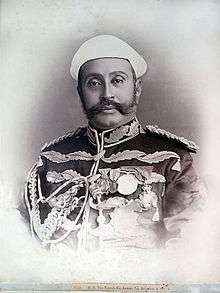
Family tree
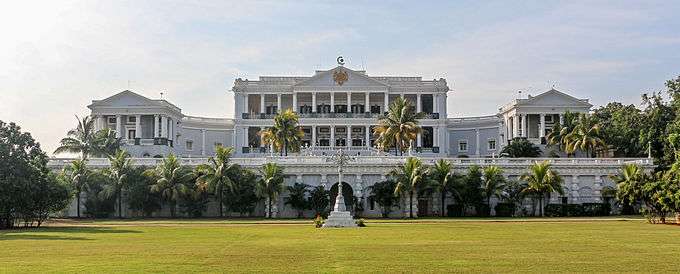
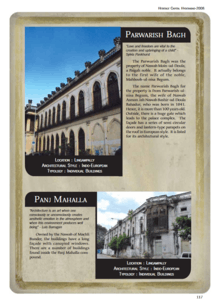
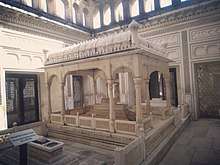
- Nawab Abul Fateh Khan Tegh Jung, Shams ud Dowla I, Shams ul Mulk I,Shams ul Umra I
- Shams ud Dowla II, Shams ul Mulk II, Shams ul Umra II, Amir e Kabir I, Nawab ‘Abu’l Fakhr Muhammad Fakhr ud-din Khan Bahadur (served as Prime Minister of Hyderabad)
- Sahibzada Muhammad Farid ud-din Khan ( Died without issue)
- Shams ul Umra III, Amir e Kabir II, Nawab Rafi ud-din Khan Bahadur ( died without issue, adopted nephews Sir Asman Jah and Muthasham ud Dowla)
- Shams ud Dowla II, Shams ul Mulk II, Shams ul Umra II, Amir e Kabir I, Nawab ‘Abu’l Fakhr Muhammad Fakhr ud-din Khan Bahadur (served as Prime Minister of Hyderabad)
- Bashir ul-Mulk, Muhtasham ud-Daula, Nawab Muhammad Sultan ud-din Khan Bahadur
- Asman Jah, Amir e Akbar, Nawab Sir Muhammad Mazhar ud-din Khan Bahadur son of Nawab Sultanuddin Khan(served as Prime Minister of Hyderabad)
- Amir-e-Paigah-e-Asman Jahi, Nawab Moin ud-Daula Bahadur, Nawab Muhammad Moin ud-din Khan Bahadur
- Raheem Unnisa Begum Sahiba (First Wife)
- Ladli Begum Sahiba (Second Wife) Kulsum Begum Sahiba successor of Ladli Begum Sahiba
- Liyaqath Begum Sahiba (Third Wife)
- Mehboob Begum Sahiba (Fourth Wife)
- Amir-e-Paigah-e-Asman Jahi, Nawab Moin ud-Daula Bahadur, Nawab Muhammad Moin ud-din Khan Bahadur
- Muhtasham ud-Daula, Nawab Muhammad Wazir ud-din Khan Bahadur
- Asman Jah, Amir e Akbar, Nawab Sir Muhammad Mazhar ud-din Khan Bahadur son of Nawab Sultanuddin Khan(served as Prime Minister of Hyderabad)
- Shams ul Umra IV, Amir e Kabir III, Viqar ul Umra I, Nawab Muhammad Rashid ud-din Khan Bahadur
- Khurshid Jah, Shams ul Umra V, Amir e Kabir IV, Amir e Paigah, Nawab Sir Muhammad Muhi ud-din Khan Bahadur
- Viqar ul Umra II, Iqtedar-ul-Mulk,Iqbal-ud-Dowla,Sikandar Jung Amir e Paigah, Nawab Sir Muhammad Fazl ud-din Khan Bahadur (served as Prime Minister of Hyderabad1893 to 1901).
- Shams ul Umra IV, Amir e Kabir III, Viqar ul Umra I, Nawab Muhammad Rashid ud-din Khan Bahadur
- Nawab Sultan-ul-Mulk Bahadur, Iqtedar-ud-Dowla, Namwar Jung, Amir-e-Paigah 1902 -1949
- Nawab Abu'Fatah Khan Bahadur (eldest son of Nawab Sultan ul Mulk) .
- Nawab Muzaffar Nawaz Jung Bahadur (Second son of Nawab Sultan ul Mulk).
- Nawab Fareed Nawaz Jung Bahadur(Third son of Nawab Sultan ul Mulk).
- Nawab Nazeer Nawaz Jung Bahadur (Fourth son of Nawab Sultan ul Mulk).
- Nawab Khair Nawaz Jung Bahadur(Fifth son of Nawab Sultan ul Mulk).
- Nawab Hassan Yar Jung Bahadur (Sixth
son of Nawab Sultan ul Mulk).
- Nawab Waheed Yar Jung Bahadur (died young and without issue)
- Wali ud-Daula, Nawab Wali ud-din Khan Bahadur (served as Prime Minister of Hyderabad) (younger son of Sir Vicar ul Umara Bahadur)
- Nawab Muhammad Bashir ud-din Khan Bahadur, Bashir Yar Jung
- Wali ud-Daula, Nawab Wali ud-din Khan Bahadur (served as Prime Minister of Hyderabad) (younger son of Sir Vicar ul Umara Bahadur)
Note: The family tree only covers some notable members. There are hundreds of members
Relationship with the Nizams
The bond between the Nizams and the Paigah nobility strengthened with the marriage of Abul Fatah Khan’s son Fakhruddin Khan with the daughter of Mir Nizam Ali Khan, Asaf Jah II, Sahebzadi Bashirunissa Begum in 1797. Henceforth, Fakhruddin Khan’s descendants married daughters of other Nizams and consequently, in protocol, the Paigah's were considered next only to the Nizams. The Paigah jagir was the largest in the state, second only to the Nizam.
The Paigah nobility, being sons-in-law and brothers-in-law to the Nizams, were to a certain extent above the law. The local police and courts did not have personal or in rem jurisdiction over their persons or property. They were subject only to the jurisdiction of the Nizam.
Tombs
The Paigah Tombs are the tombs belonging to the nobility of Paigah family. They were constructed over a period of time during the 18th, 19th and 20th centuries. They are located at the Santoshnagar locality of Hyderabad. The tombs are made out of lime and mortar with beautiful inlaid marble carvings.[5]
Paigah Deodis
The Paigah noblemen were known for their residences, usually known as Devdis.[6]
Bashir Bagh Palace belonged to Sir Asman Jah, a Paigah Amir (noble) and Prime Minister of Hyderabad (1887–1893).
Sir Vicar-ul-Umra, the Paigah Amir (noble) and the then prime minister of Hyderabad state 1894–1901 (also officiated as prime minister in 1893) presented Falaknuma palace in 1897, easily one of the most opulent palaces in the country to the sixth Nizam, Mir Mahbub Ali Khan.
Other important Paigah Palaces were:
- Asman Garh Palace
- Paigah Palace
- Khursheed Jah Devdi[7][8]
- Vikhar Manzil[9]
- Devdi Iqbal ud-Dowla
- Parwarish Bagh
See also
References
- Safvi, Rana (21 January 2018). "The Paigah's necropolis". The Hindu. ISSN 0971-751X. Retrieved 22 July 2018.
- Lynton, Harriet Ronken; Rajan, Mohini (1974). The Days of the Beloved. University of California Press. ISBN 9780520024427.
- Mudiraj, Krishna Swamy K. (1929). Pictorial Hyderabad. 1. Read Book (2006). p. 45-50. ISBN 9781846643651. Retrieved 6 August 2020.
- https://www.thehindu.com/todays-paper/tp-features/tp-metroplus/saads-jung/article3894869.ece
- Sripada, Krishna (13 July 2017). "The Paigah Tombs: The lime and mortar wonders". The Hindu. ISSN 0971-751X. Retrieved 23 August 2018.
- "Forgotten Heritage: The Devdis of Hyderabad - Go UNESCO | GoUNESCO". www.gounesco.com. Retrieved 5 August 2018.
- "Devdi Khurshid Jah in a state of dilapidation | The Siasat Daily". archive.siasat.com. Retrieved 22 July 2018.
- Khan, Asif Yar (16 July 2014). "Khursheed Jah Devdi cries for attention". The Hindu. ISSN 0971-751X. Retrieved 22 July 2018.
- "The Hindu : Palace with a view". www.thehindu.com. Retrieved 22 July 2018.